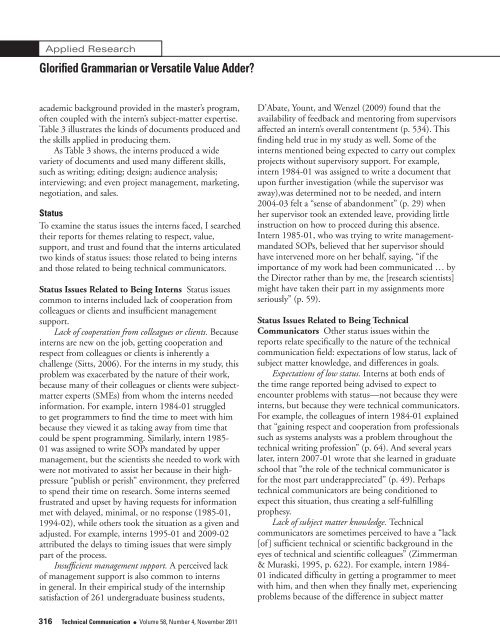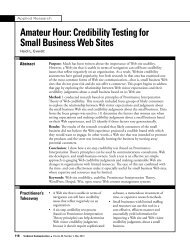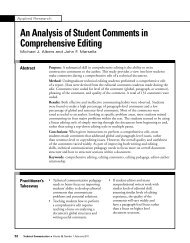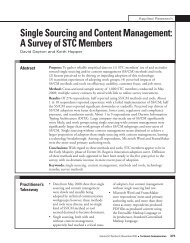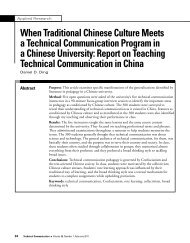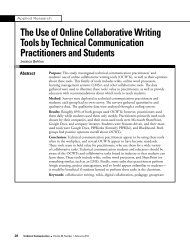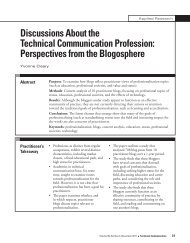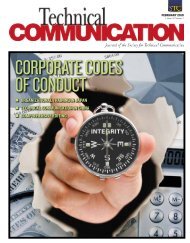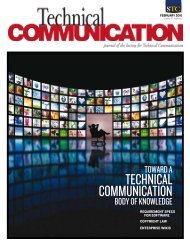SPECIAL ISSUE
Download: November 2011 - Technical Communication - Society for ...
Download: November 2011 - Technical Communication - Society for ...
- No tags were found...
You also want an ePaper? Increase the reach of your titles
YUMPU automatically turns print PDFs into web optimized ePapers that Google loves.
Applied ResearchGlorified Grammarian or Versatile Value Adder?academic background provided in the master’s program,often coupled with the intern’s subject-matter expertise.Table 3 illustrates the kinds of documents produced andthe skills applied in producing them.As Table 3 shows, the interns produced a widevariety of documents and used many different skills,such as writing; editing; design; audience analysis;interviewing; and even project management, marketing,negotiation, and sales.StatusTo examine the status issues the interns faced, I searchedtheir reports for themes relating to respect, value,support, and trust and found that the interns articulatedtwo kinds of status issues: those related to being internsand those related to being technical communicators.Status Issues Related to Being Interns Status issuescommon to interns included lack of cooperation fromcolleagues or clients and insufficient managementsupport.Lack of cooperation from colleagues or clients. Becauseinterns are new on the job, getting cooperation andrespect from colleagues or clients is inherently achallenge (Sitts, 2006). For the interns in my study, thisproblem was exacerbated by the nature of their work,because many of their colleagues or clients were subjectmatterexperts (SMEs) from whom the interns neededinformation. For example, intern 1984-01 struggledto get programmers to find the time to meet with himbecause they viewed it as taking away from time thatcould be spent programming. Similarly, intern 1985-01 was assigned to write SOPs mandated by uppermanagement, but the scientists she needed to work withwere not motivated to assist her because in their highpressure“publish or perish” environment, they preferredto spend their time on research. Some interns seemedfrustrated and upset by having requests for informationmet with delayed, minimal, or no response (1985-01,1994-02), while others took the situation as a given andadjusted. For example, interns 1995-01 and 2009-02attributed the delays to timing issues that were simplypart of the process.Insufficient management support. A perceived lackof management support is also common to internsin general. In their empirical study of the internshipsatisfaction of 261 undergraduate business students,D’Abate, Yount, and Wenzel (2009) found that theavailability of feedback and mentoring from supervisorsaffected an intern’s overall contentment (p. 534). Thisfinding held true in my study as well. Some of theinterns mentioned being expected to carry out complexprojects without supervisory support. For example,intern 1984-01 was assigned to write a document thatupon further investigation (while the supervisor wasaway),was determined not to be needed, and intern2004-03 felt a “sense of abandonment” (p. 29) whenher supervisor took an extended leave, providing littleinstruction on how to proceed during this absence.Intern 1985-01, who was trying to write managementmandatedSOPs, believed that her supervisor shouldhave intervened more on her behalf, saying, “if theimportance of my work had been communicated … bythe Director rather than by me, the [research scientists]might have taken their part in my assignments moreseriously” (p. 59).Status Issues Related to Being TechnicalCommunicators Other status issues within thereports relate specifically to the nature of the technicalcommunication field: expectations of low status, lack ofsubject matter knowledge, and differences in goals.Expectations of low status. Interns at both ends ofthe time range reported being advised to expect toencounter problems with status—not because they wereinterns, but because they were technical communicators.For example, the colleagues of intern 1984-01 explainedthat “gaining respect and cooperation from professionalssuch as systems analysts was a problem throughout thetechnical writing profession” (p. 64). And several yearslater, intern 2007-01 wrote that she learned in graduateschool that “the role of the technical communicator isfor the most part underappreciated” (p. 49). Perhapstechnical communicators are being conditioned toexpect this situation, thus creating a self-fulfillingprophesy.Lack of subject matter knowledge. Technicalcommunicators are sometimes perceived to have a “lack[of] sufficient technical or scientific background in theeyes of technical and scientific colleagues” (Zimmerman& Muraski, 1995, p. 622). For example, intern 1984-01 indicated difficulty in getting a programmer to meetwith him, and then when they finally met, experiencingproblems because of the difference in subject matter316 Technical Communication l Volume 58, Number 4, November 2011


